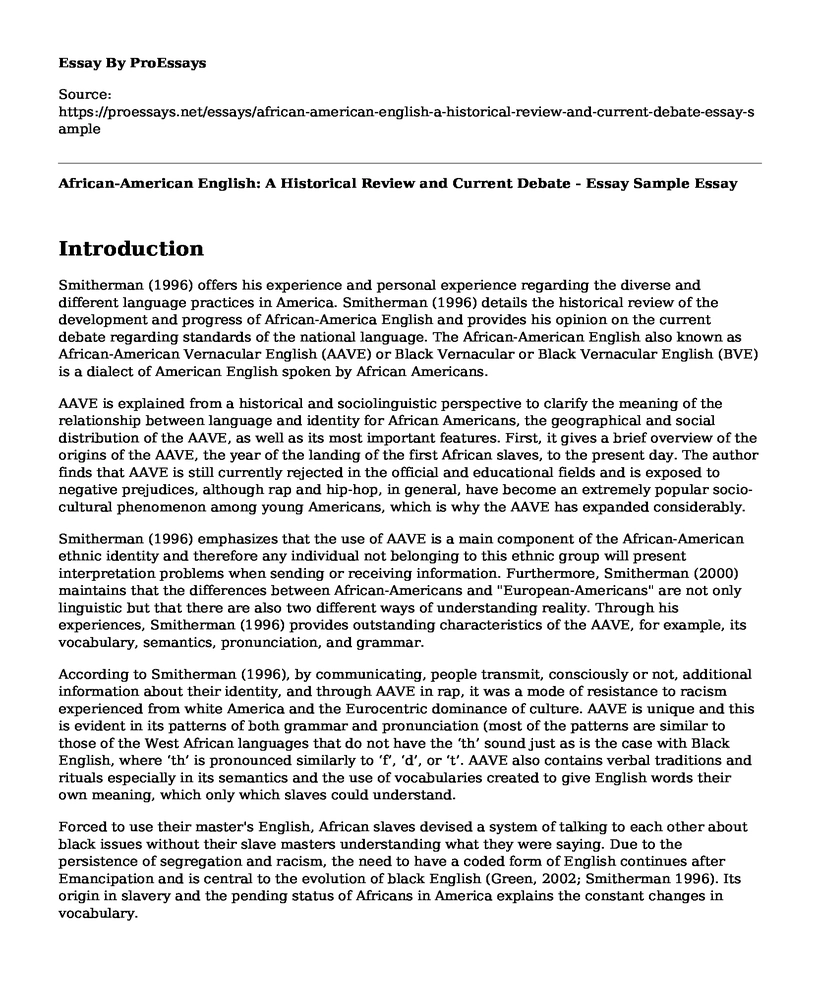Introduction
Smitherman (1996) offers his experience and personal experience regarding the diverse and different language practices in America. Smitherman (1996) details the historical review of the development and progress of African-America English and provides his opinion on the current debate regarding standards of the national language. The African-American English also known as African-American Vernacular English (AAVE) or Black Vernacular or Black Vernacular English (BVE) is a dialect of American English spoken by African Americans.
AAVE is explained from a historical and sociolinguistic perspective to clarify the meaning of the relationship between language and identity for African Americans, the geographical and social distribution of the AAVE, as well as its most important features. First, it gives a brief overview of the origins of the AAVE, the year of the landing of the first African slaves, to the present day. The author finds that AAVE is still currently rejected in the official and educational fields and is exposed to negative prejudices, although rap and hip-hop, in general, have become an extremely popular socio-cultural phenomenon among young Americans, which is why the AAVE has expanded considerably.
Smitherman (1996) emphasizes that the use of AAVE is a main component of the African-American ethnic identity and therefore any individual not belonging to this ethnic group will present interpretation problems when sending or receiving information. Furthermore, Smitherman (2000) maintains that the differences between African-Americans and "European-Americans" are not only linguistic but that there are also two different ways of understanding reality. Through his experiences, Smitherman (1996) provides outstanding characteristics of the AAVE, for example, its vocabulary, semantics, pronunciation, and grammar.
According to Smitherman (1996), by communicating, people transmit, consciously or not, additional information about their identity, and through AAVE in rap, it was a mode of resistance to racism experienced from white America and the Eurocentric dominance of culture. AAVE is unique and this is evident in its patterns of both grammar and pronunciation (most of the patterns are similar to those of the West African languages that do not have the ‘th’ sound just as is the case with Black English, where ‘th’ is pronounced similarly to ‘f’, ‘d’, or ‘t’. AAVE also contains verbal traditions and rituals especially in its semantics and the use of vocabularies created to give English words their own meaning, which only which slaves could understand.
Forced to use their master's English, African slaves devised a system of talking to each other about black issues without their slave masters understanding what they were saying. Due to the persistence of segregation and racism, the need to have a coded form of English continues after Emancipation and is central to the evolution of black English (Green, 2002; Smitherman 1996). Its origin in slavery and the pending status of Africans in America explains the constant changes in vocabulary.
In general, it can be stated that the language of African Americans is their own and different. It is a language born out of the horrors of the African journey and developed during slavery, segregation, and the emigration of the rural South from plantations to the cities of the South and the North. It has been enriched using rap, jazz, and hip-hop music. With deep African roots, it has a spirit of resistance to the dominant culture, which constantly invigorates and transforms it. Although there is debate about whether black English is a language or a dialect, one cannot deny its integrity since so many African Americans speak it up to now.
References
Green, L. J. (2002). African American English: a linguistic introduction. Cambridge University Press. https://books.google.co.ke/books?hl=en&lr=&id=bcpuNbPu-LgC&oi=fnd&pg=PP11&dq=African-American+English&ots=woS1EbRviV&sig=DZ5uLZSVHjFc4tMHfq9wRyZdUA4&redir_esc=y#v=onepage&q=African-American%20English&f=false
Smitherman, G. (1996). African-American English: From the hood to the amen corner. The University of Minnesota. http://writing.umn.edu/lrs/assets/pdf/speakerpubs/Smitherman.pdf
Smitherman, G. (2000). Black talk: Words and phrases from the hood to the amen corner. Houghton Mifflin Harcourt. https://pdfs.semanticscholar.org/fcfd/3128fbc4e8fa2e8af9a8a09f1237c75e02b2.pdf
Cite this page
African-American English: A Historical Review and Current Debate - Essay Sample. (2023, Aug 21). Retrieved from https://proessays.net/essays/african-american-english-a-historical-review-and-current-debate-essay-sample
If you are the original author of this essay and no longer wish to have it published on the ProEssays website, please click below to request its removal:
- Self-Assessment on My English Semester - Essay Sample
- Questions and Answers on Gun Violence at Harper High School Paper Example
- Experiential Learning Theory Paper Example
- Paper Example on Native American Cultural Heritage: Exploring Its History and Spirituality
- Stomp Rocket Stunt Plane: An Exciting Toy for Kids' Growth and Development - Essay Sample
- Essay Example on Fredrick Douglass: Slave to Icon of Black American History
- Essay Example on Minorities in Information Technology







